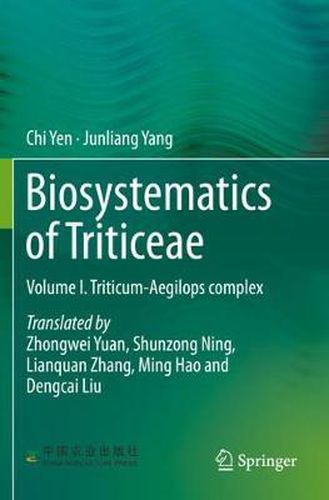Readings Newsletter
Become a Readings Member to make your shopping experience even easier.
Sign in or sign up for free!
You’re not far away from qualifying for FREE standard shipping within Australia
You’ve qualified for FREE standard shipping within Australia
The cart is loading…






This title is printed to order. This book may have been self-published. If so, we cannot guarantee the quality of the content. In the main most books will have gone through the editing process however some may not. We therefore suggest that you be aware of this before ordering this book. If in doubt check either the author or publisher’s details as we are unable to accept any returns unless they are faulty. Please contact us if you have any questions.
This book discusses the natural classification and biosystematics of Triticeae, and presents the most significant findings of comprehensive studies on the Triticeae, an important tribe in the grass family (Poaceae) that includes major crops such as wheat, barley, rye and triticale, as well as various forage crops found in different genera. The five-volume Chinese version of Biosystematics of Triticeae was published in 1998, 2004, 2006, 2011, and 2013, and included the 30 genera, 2 subgenera, 464 species, 9 subspecies, and 186 varieties of Triticeae identified to date. This completely revised English edition features up-to-date international research and the latest advances in the field.
The book is divided into five volumes, covering a wide range of disciplines from traditional taxonomy and cytogenetics, to molecular phylogeny.
Volume I, Triticum-Aegilops complex focuses on the taxonomy and generic relationships of Triticum and Aegilops, discussing the origin of common wheat as a crop.
Volume II highlights the taxonomy and systematics of Secale, Tritiosecale, Pseudosecale, Eremopyrum, Henrardia, Taeniantherum, Heteranthelium, Crithopsis, and Hordeum. Volume III describes perennial genera and species including Kengyilia, Douglasdeweya, Agropyron, Australopyrum, and Anthosachne.
Volume IV addresses perennial genera and species including Stenostachys, Psathyrostachys, Leymus, Pseudoroegneria, and Roegeneria.
Volume V presents perennial genera and species such as Campeiostachys, Elymus,Pascopyrum, Lophopyrum, Trichopyrum, Hordelymus, Festucopsis, Peridictyon, and Psammopyrum.
$9.00 standard shipping within Australia
FREE standard shipping within Australia for orders over $100.00
Express & International shipping calculated at checkout
This title is printed to order. This book may have been self-published. If so, we cannot guarantee the quality of the content. In the main most books will have gone through the editing process however some may not. We therefore suggest that you be aware of this before ordering this book. If in doubt check either the author or publisher’s details as we are unable to accept any returns unless they are faulty. Please contact us if you have any questions.
This book discusses the natural classification and biosystematics of Triticeae, and presents the most significant findings of comprehensive studies on the Triticeae, an important tribe in the grass family (Poaceae) that includes major crops such as wheat, barley, rye and triticale, as well as various forage crops found in different genera. The five-volume Chinese version of Biosystematics of Triticeae was published in 1998, 2004, 2006, 2011, and 2013, and included the 30 genera, 2 subgenera, 464 species, 9 subspecies, and 186 varieties of Triticeae identified to date. This completely revised English edition features up-to-date international research and the latest advances in the field.
The book is divided into five volumes, covering a wide range of disciplines from traditional taxonomy and cytogenetics, to molecular phylogeny.
Volume I, Triticum-Aegilops complex focuses on the taxonomy and generic relationships of Triticum and Aegilops, discussing the origin of common wheat as a crop.
Volume II highlights the taxonomy and systematics of Secale, Tritiosecale, Pseudosecale, Eremopyrum, Henrardia, Taeniantherum, Heteranthelium, Crithopsis, and Hordeum. Volume III describes perennial genera and species including Kengyilia, Douglasdeweya, Agropyron, Australopyrum, and Anthosachne.
Volume IV addresses perennial genera and species including Stenostachys, Psathyrostachys, Leymus, Pseudoroegneria, and Roegeneria.
Volume V presents perennial genera and species such as Campeiostachys, Elymus,Pascopyrum, Lophopyrum, Trichopyrum, Hordelymus, Festucopsis, Peridictyon, and Psammopyrum.